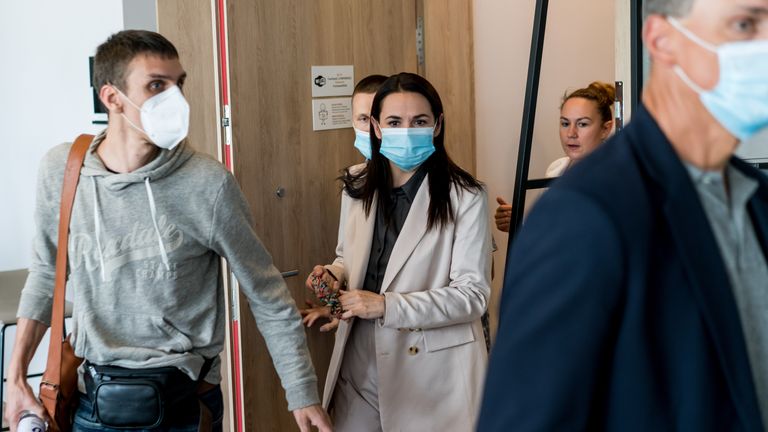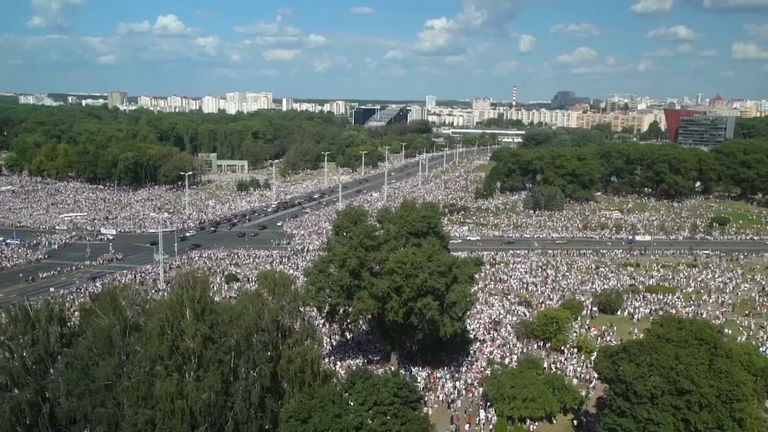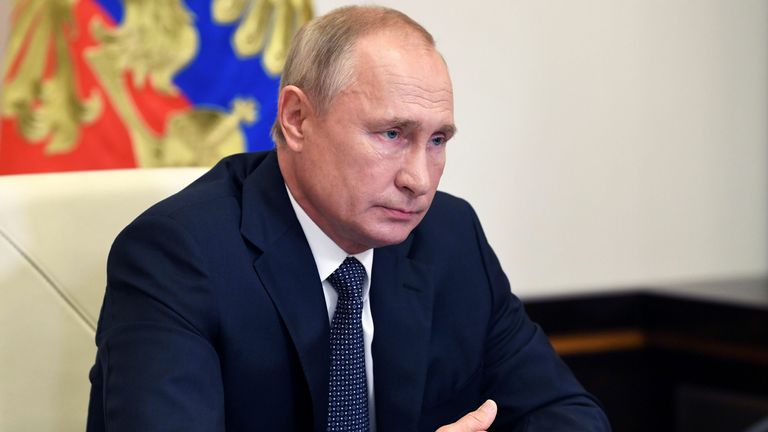Belarus’s main opposition challenger has revealed she will return home when the regime is ready for dialogue and is even willing to engage with President Alexander Lukashenko.
Svetlana Tikhanovskaya, who fled to Lithuania after challenging the results of a disputed presidential election two weeks ago, told Sky News the momentum for change in her country is unstoppable even if protests reduce in size because of state intimidation tactics.
She urged armed forces and the police not to turn on fellow Belarusians if ordered by the strongman ruler to use violence again against peaceful demonstrators.
But she said she doubted whether the regime would resort to more punishment beatings and repressive crowd control because it had previously fuelled rather than dampened dissent.
Mrs Tikhanovskaya, 37, speaking at a hotel in the Lithuanian capital Vilnius, said she would go back to Belarus as soon as the government signals it is ready to speak and once all political prisoners – including her jailed activist husband – are freed.
“I think that will be the moment I will go back there and will be with my husband and people,” she said, speaking in English.
She has helped to establish a co-ordination council to oversee a transition of power. However, the regime is trying to launch a criminal case against it, accusing the body of attempting to “seize power”.
She said the council would continue its work regardless.
As for whether she would be willing to sit down and talk to Mr Lukashenko, his opponent said: “If it is the necessity and I will understand it is necessary so why not?”
:: Listen to the Daily podcast on Apple Podcasts, Google Podcasts, Spotify, Spreaker
The political novice did a round of media interviews a day after emerging from hiding to give a press conference.
She said she was not yet ready to talk about what happened to her during several hours inside a government electoral office on 10 August.
It is thought she was threatened with being separated from her two young children, whom she had already moved to Lithuania.
Mrs Tikhanovskaya, a trained English teacher and previously a full-time mother, is an unlikely political heavyweight.
She only took on the president when her husband, a political activist, was jailed and barred from running in the election.
Her simple message – promising free and fair elections – won her huge support.
It made the official outcome of the polls, which awarded 80% of the vote to Mr Lukashenko and just 10% to his main rival, implausible.
Outrage at the results triggered nationwide protests that were met initially with widespread state violence, which drew even more support for those opposing the regime.
Tens of thousands of people took to the streets last Sunday.
Mr Lukashenko then faced heckles and jeers when he spoke at a factory – his traditional support base.
But in recent days, renewed threats and intimidation from authorities against dissent has dampened what had been a carnival atmosphere of resistance.
Mr Tikhanovskaya said she could not predict how many people would attend another mass demonstration planned for this Sunday, but said change was coming regardless of crowd size.
“I believe in our people and actually we will not lose this moment,” she said.
“Even if this moment will slow down or calm down a little bit, our people they will not accept our president anymore.”
She had this message for the security forces in case they are ordered to crackdown on protesters: “You can’t go against your mothers, your sisters and your brothers. You don’t have to do this.”
She said she had spoken to a number of Western leaders during her time in Lithuania but had not yet been contacted by Russia’s President Vladimir Putin.
Russia is a key stakeholder in Belarus, a former Soviet state that retains close cultural, economic and military ties.
Asked whether she should call Mr Putin, she said: “Maybe I will write down a message for him. I don’t know yet but I always called for every nation, and Russia is among these countries … to respect the sovereignty of our country and I am sure they will get this message.”
Asked to clarify whether she did plan to write the Russian leader a note, she said: “Who knows?”
Mr Lukashenko has tried to portray his opponents as being backed by the European Union, the US and other Western allies.
Mrs Tikhasnovskaya noted that, by contrast, when she ran against him he accused his rivals of having links to Russia.
She said she was subjected to no external influence.
“We are for our country, our sovereign country,” she said.
Mrs Tikhanovskaya appeared ready for a long fight if necessary.
“Everybody has to understand that it can last a couple of days or weeks [or] so it can take a lot of time,” she said.
“But I believe in the fact that our authority wants the best for the country and they understand that this crisis has to end and the sooner it ends, the better for country.”




